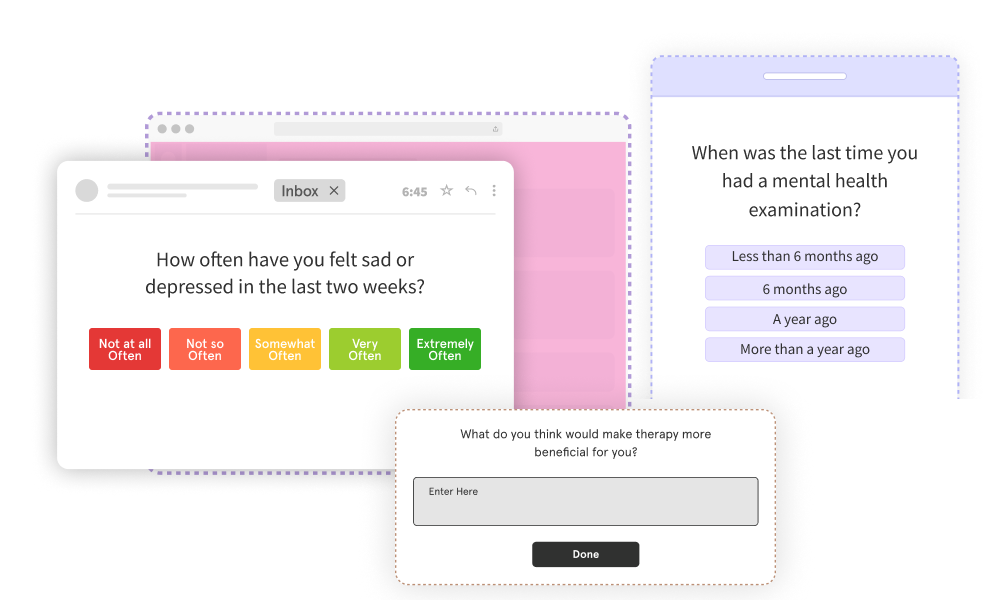How patients view different mental health treatments can be very subjective. This is especially true in the case of Cognitive Behavioral Therapy. So when you’re collecting feedback from mental health patients, it is recommended to create detailed surveys that allow patients to share all their concerns and feedback.
Any feedback survey would generally begin with asking the respondent to rate their overall satisfaction. Similarly, in the case of mental health patient surveys, you can measure the overall satisfaction of the patient with the treatment. And then to collect detailed feedback, you can ask the most specific mental health survey questions that pertain the nuances of the treatment method and care.
Measure Patient Feedback and Satisfaction👩⚕️
Create your healthcare surveys and questionnaires and gauge feedback from patients in real-time.

What are some feedback questions for mental health patients that enable capturing patients’ views in a detailed and insightful manner? Let’s discuss.
Top Feedback Questions for Mental Health Patients
- What brings you here today?
- What positive changes would you like to see happen in your life?
- What do you expect from the counseling process?
- What do you view as the biggest problem?
- How have you been feeling lately?
- What has been the most challenging part of your treatment so far?
- What have you been able to achieve or accomplish since the therapy/treatment started?
- What is something that you wish we had worked on more in therapy?
- What do you think would make therapy more beneficial for you?
-
How do you feel after today's session? Would you like to talk about anything in particular?"
What brings you here today?
Asking a mental health patient "What brings you here today?" is a standard way for a healthcare professional to begin a conversation and gather information about the patient's current concerns or reasons for seeking treatment. This question can help the professional understand the patient's symptoms, any potential triggers or stressors, and the patient's overall mental health status. Additionally, it can help the professional identify any urgent or pressing issues that need to be addressed immediately, as well as any long-term treatment goals that the patient may have.
What positive changes would you like to see happen in your life?
This is a way for the healthcare professional to understand the patient's goals and aspirations. This question can help the professional understand the patient's priorities, their values, and what they hope to achieve through treatment. It can also provide insight into the patient's motivation for seeking help and what they hope to achieve through therapy. Additionally, this question can help the professional to develop a treatment plan that is tailored to the patient's individual needs and goals, and can also be used as a way to measure progress throughout the treatment.
What do you expect from the counseling process?
This open-ended question is a way for the healthcare professional to understand the patient's expectations and goals for therapy. This question can help the professional understand what the patient hopes to achieve through counseling, what specific issues they would like to address, and what they think the process will be like. It also helps establish trust and build a positive therapeutic relationship between the patient and the professional.
What do you view as the biggest problem?
This open-ended question helps healthcare professionals to understand their patients’ perspective on their mental health concerns and what they believe to be the main issue that needs to be addressed. This question can help the professional understand the patient's symptoms and the impact they have on their daily life, as well as any potential triggers or stressors that may be contributing to their mental health concerns.
A lot of patients mainly face the issue of sleep lack. Research suggests that combining CBT-I with melatonin supplementation may enhance sleep improvement for certain individuals. The behavioral changes learned through CBT-I can be complemented by the sleep-regulating effects of melatonin. And doctors estimate the healthy melatonin dosage with a melatonin dosage calculator online. The tool helps medical experts to prescribe their patients with the normal drug dosage so that they could sleep better while experiencing CBt-I therapy session.
How have you been feeling lately?
This question instantly encourages patients to observe their own feelings and share from their experience exactly how they feel. This is a great feedback question for mental health patients since it helps understand the patient's current emotional state and any changes in their symptoms or mental health status. Healthcare providers can understand if the patient is feeling any better after the treatment started. And since it is an open-ended question, patients can provide a more detailed and nuanced understanding of their current state, which may not be possible with a simple "yes" or "no" answer.
What has been the most challenging part of your treatment so far?
This is a way for the healthcare professionals to understand any difficulties or obstacles that the patient may have encountered during their treatment. This question can help the healthcare provider understand what is preventing the patient from making progress or benefiting from therapy, which then makes way for adjustments to the treatment plan. It can also help identify any barriers that may be hindering the patient's engagement with the provider or adherence to therapy or treatment.
What have you been able to achieve or accomplish since the therapy/treatment started?
This open-ended question helps understand the patient's progress and the changes that have occurred in their life since the therapy or treatment started. This question can help the healthcare provider understand how the patient is implementing what they have learned in therapy in their daily life, and what positive changes they have made. It also allows the professional to see the progress the patient has made toward their treatment goals and can be used as a way to measure progress throughout the treatment.
What is something that you wish we had worked on more in therapy?
Often, patients may be hesitant to share concerns. But asking them what they wished had been worked on more can encourage them to share if certain expectations were not fulfilled. This helps in identifying any challenges or concerns the patient may have about therapy, and to address them in a timely manner.
What do you think would make therapy more beneficial for you?
This is an excellent open-ended question to seek suggestions from your patient and include them in the decisions of their own health. Patients can share from their first-hand experience what they would like you to do better. For example, instead of journaling, talking it out may work better for some patients. With patients’ answer to this question, the healthcare provider can understand how to tailor treatment to different types of patients.
How do you feel after today's session? Would you like to talk about anything in particular?"
This feedback question is excellent for understanding the patient's immediate reactions and feelings following a therapy session. This question can help the professional understand how the patient is processing and integrating the information and insights discussed during the session, as well as how they are feeling emotionally. It also allows the professional to identify any issues or concerns that the patient may have that they would like to discuss further before ending the session.
It is important to note that these are just examples and that the professional should tailor the questions to the individual patient, as well as the context of the treatment. It is also crucial for the professional to create a safe and non-judgmental space for the patient to give honest feedback, which can help to build trust and a positive therapeutic relationship.
If you’re building a mental health survey template, but don’t know where to begin, you can use this article as a reference. You can also use our readymade mental health patient feedback survey template for free. All you need to do is go to Zonka Feedback and sign up for a 14-day free trial.












